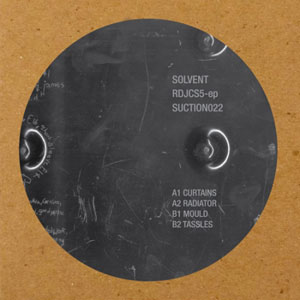Solvent RDJCS5 EP
With the magnitude of the names and backstory attached to Solvent‘s RDJCS5 EP, analogophile Jason […]

With the magnitude of the names and backstory attached to Solvent‘s RDJCS5 EP, analogophile Jason Amm’s new 12″ has quite a legacy to live up to. The tale goes: “In April 2006, a Yamaha CS5 monosynth, having been owned by Richard D. James (a.k.a. Aphex Twin), with the actual liner notes for his landmark Selected Ambient Works Vol. II etched into the bottom, was sold at a VEMIA auction for approximately $1200, a bargain in retrospect. The winning bidder was, in fact, a friend of Solvent’s, and the synth resides not in a display case but in Solvent’s studio, on generous long-term loan.” Luckily, this enviable piece of electronic-music history is in the hands of a veteran producer, one who uses it to craft four excellent additions to the annals of the genre.
Surprisingly or not, the RDJCS5 EP sounds little like the seminal 1994 LP that Aphex Twin may have used it on, though it actually bares some resemblance to the sounds heard in James’ later Analord series. The flitty, atonal groove of “Radiator” brings to mind the noisier tracks on those 12″s, whereas record opener “Curtains,” the most upbeat of Solvent’s new tunes, could easily go toe-to-toe with buoyant jams like “I’m Self Employed” and “Crying in Your Face.” “Tassels” earns its place as the track closest to resembling anything from Vol. II, thanks to a straightforward dance rhythm, a few woozy synth melodies, and a general air of disconcertion that flows throughout its five and a half minutes.
That said, this isn’t supposed to be a record of Aphex Twin imitations. Plenty of those have already been made, which Amm is certainly aware of, so he makes sure that his own playfully skewed production style shines through on much of the RDJCS5 EP. A couple of the tracks could’ve easily appeared on either of the last two Solvent LPs, and some may even be stylistic steps forward for the artist. Still, it’s hard for the music to not be overshadowed by the ghost of this particular instrument’s forebearer, which seems to intensify the obvious influence James has had on Solvent’s music. After hearing RDJCS5, maybe that actually isn’t such a bad thing.

